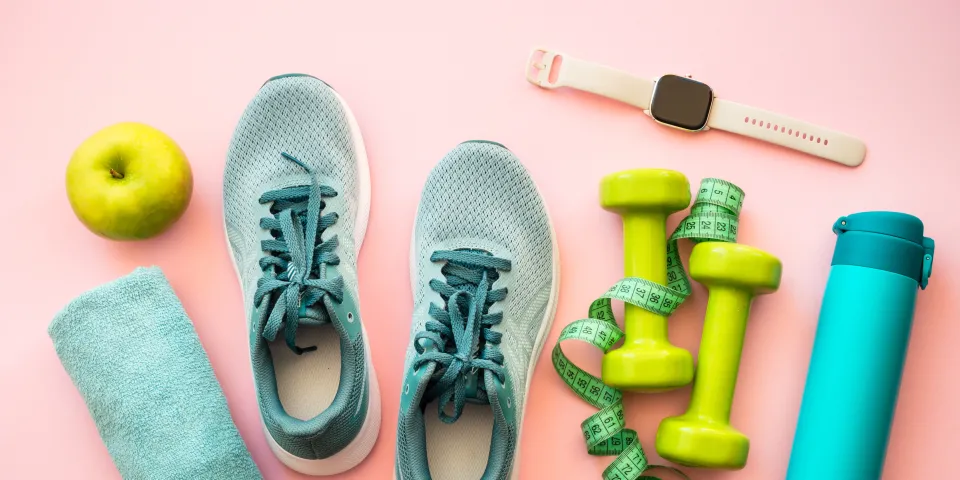Latest
Ultimate Nurses Workout Routine
Apr 15, 2025

If you’re a nurse who struggles with maintaining a workout schedule, you’re not alone. With long shifts, hours on your feet and constant movement, nursing can take a physical toll on your body even without hitting the gym. It can be very tempting to come home after a long shift and scroll mindlessly through streaming services to unwind over a bag of chips.
Nursing requires a lot of resilience, which is why it is so important to maintain a regular healthy exercise regime. Studies show that regular physical activity can improve cardiovascular health, enhance endurance and serve as a much-needed stress reliever.
If you’re ready to start taking charge of your health, here are some simple and effective exercises that are perfect for busy nurses:
Stretches
Research has shown that stretching can help improve the flexibility and the range of motion of your joints. Stretching is a simple and effective way to relieve muscle tension during short breaks. You should concentrate your stretches on major muscle groups such as your calves, thighs, hips, lower back, neck and shoulders. Make sure that you breathe normally and hold each stretch for about 30 to 60 seconds.
Walk
A brisk walk, even if it’s just around the hospital or clinic, can do wonders for your health. Walking helps improve circulation, clear your mind and reduce stress. If you have a longer break, consider taking a walk outside to get some fresh air.
If your workplace has stairs, take them instead of the elevator as part of your workout routine. If you live close to your workplace, consider walking or cycling instead of driving. If driving is your only option, try parking further from the entrance. This small change can add a few extra minutes of walking to your day.
Push-Ups or Planks
Push-ups are a great way to build upper body strength. They target the chest, shoulders, and triceps while also engaging the core. If traditional push-ups are too challenging, you can modify them by performing them on your knees or against a wall.
Planks are another option if you are unable to do a push-up. Planks work the abdominal muscles, back, and shoulders, providing a full-body workout in one simple move. Start with short holds that last 30 seconds and gradually increase the time as your strength improves.
Squats
Squats are a fantastic exercise for strengthening the lower body. They also engage the core, helping to improve balance and stability. Squats improve your flexibility, too. As you become older, your tendons, muscles, and ligaments become less elastic. Regularly doing squats can help slow down this process and limber you up. Try doing a set of squats during your break or as part of your morning routine.
Tips for Your Exercise Routine
- Incorporate exercise into your daily routine: You will always have to do housework, so why not make it an exercise? You can challenge yourself by lifting laundry, doing lunges while picking up toys, squats while sweeping the floor or balance while washing dishes. You could also exercise while relaxing. If you are able to, you can ride a stationary bike, lift weights or do yoga while watching TV or listening to an audiobook.
- Find exercises you enjoy: Exercise shouldn’t be a chore. If you find enjoyment in communal exercise, maybe join a support group that does Zumba, hiking or hot yoga. If you prioritize solitude, maybe work out in the early morning or late at night. Set a goal for yourself so that you look forward to exercising. For example, you could exercise while watching the newest episode of your favorite TV show or go for a long jog that ends at a bookstore.
- Prioritize consistency over intensity: Quality is always better than quantity. It is always better to do a few minutes of exercise every day than to do an intense workout only once in a while. Set small, achievable goals every day or every other day. Listen to your body. If you had a particularly long day or a physically intense shift, be willing to cut back on your routine or shorten it even further.
Every nurse should feel fit and energized- today is your chance to get moving! By incorporating a few exercises a day, you can benefit your heart and mind.
Learn More About Our Nursing Programs
BLS pay estimates calculate the median annual wage for various occupations. Per the BLS the median wage for an occupation is: "The wage at which half of the workers in the occupation earned more than that amount, and half earned less. Median wage data are from the BLS Occupational Employment and Wage Statistics survey." Bureau of Labor Statistics (BLS), U.S. Department of Labor, Occupational Outlook Handbook 2024. BLS median wage estimates do not represent entry-level wages and/or salaries. Multiple factors, including prior experience, age, geographic market in which you want to work, and degree level and field, will affect career outcomes, including starting salary and earnings as an experienced employee. Herzing neither represents that its graduates will earn the median salaries calculated by BLS for a particular job nor guarantees that graduation from its program will result in a job, promotion, particular wage or salary, or other career growth.
Latest
Recent Blog Posts
Subscribe to our Newsletter
Get the latest news you need to know, from study hacks to interview tips to career advancement. Have it delivered right to your inbox biweekly.








